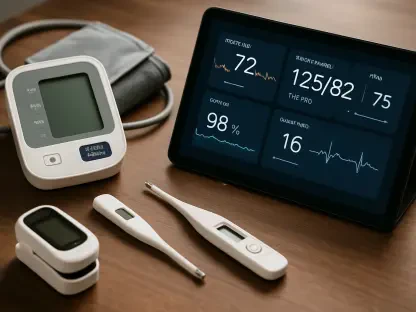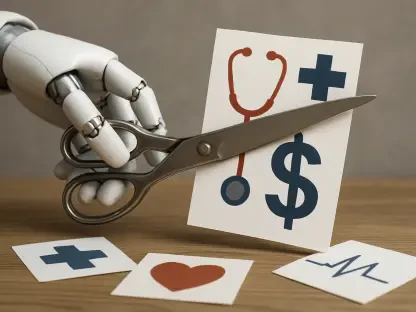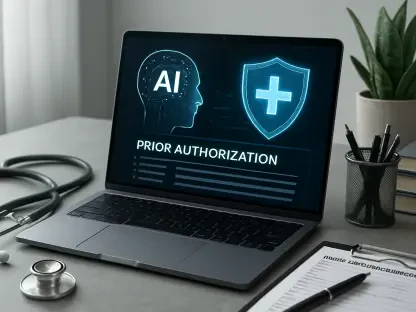The integration of AI technology into healthcare systems is proving to be a transformative approach that harnesses the potential of vast data repositories. Electronic Health Records (EHRs) are becoming pivotal in providing clinical insights essential for personalized medicine, bridging gaps in healthcare delivery, and improving patient outcomes. Artificial Intelligence is refashioning key aspects such as drug discovery and diagnostics, optimizing research methods, and enhancing precision in disease diagnosis. This technological prowess aims to reduce lead times and financial strains in introducing new pharmaceuticals into the market, offering a glimpse into what AI-driven healthcare could achieve.
The Rise of Precision Medicine in Modern Healthcare
Targeted Treatments and Disease Management
Precision medicine represents a paradigm shift wherein treatments are tailored based on genetic and phenotypic variations among patients. This approach, crucial in tackling rare genetic diseases and various cancer types, marks significant advancements in patient care. The healthcare sector has witnessed a notable increase in personalized medicine therapies, exceeding projections and illustrating rapid growth. Precision medicine therapies have seen a striking jump, underscored by proactive research and lucrative market opportunities. However, effective implementation necessitates accessing comprehensive data from diverse demographics, ensuring models are accurate and inclusive. AI promises to significantly enhance this dimension, facilitating more informed healthcare decisions.
Accessibility and Challenges in Data Utilization
Despite electronic health systems’ emphasis on managing extensive patient profiles, including detailed medication histories and laboratory results, the industry faces challenges due to fragmented data. Such fragmentation arises from decentralized data capture methods and non-standardized collection protocols, creating barriers for seamless integration. Furthermore, unstructured data presents analysis and accessibility obstacles, as free text notes and non-digitized images complicate data-sharing efforts. This inefficiency remains a hurdle, limiting stakeholders’ ability to implement research initiatives effectively. Bridging these gaps through AI interventions is pivotal to transforming raw data into actionable insights.
Key Stakeholders in Data Integration
Biopharma and Government Agencies
The key to unlocking significant healthcare advancements lies with the principal players within the ecosystem. Biopharma researchers, government agencies, and commercial teams are increasingly reliant on real-world evidence derived from EHRs. With the demand for diverse patient population data continually growing, researchers seek robust AI models capable of delivering critical insights for therapeutic development. AI tools facilitate the extraction of meaningful insights from both structured and unstructured data, offering a comprehensive view of patient care across varied demographics. Government entities, including regulatory bodies, leverage EHR data for safety assessments and effectiveness analyses. This use of technology unveils unmet needs and guides policy formulation.
Commercial Biopharma Teams and Market Strategies
In the commercial realm, biopharma teams employ data-driven methodologies to navigate market complexities and support effective product launches. AI facilitates the demonstration of therapeutic performance in real-world scenarios, thereby driving market penetration and adoption of innovative treatments. By systematically accessing healthcare data from multiple sources, these teams can strategize for better market access and employ targeted interventions. This strategic alliance between AI tools and healthcare stakeholders promises operational efficiency, fostering a landscape where data-driven precision medicine becomes a norm. Data consolidation emerges as a key focus area, with potential breakthroughs impacting patient outcomes positively.
Practical Application of AI in Healthcare
Transforming Healthcare with Veradigm’s Integrated Solutions
AI’s role is exemplified in the operations of Veradigm, an integrative data systems enterprise committed to refining healthcare delivery. Veradigm exploits AI’s potential by merging data-driven clinical insights with practical tools, improving healthcare quality and efficiency. Through its extensive EHR network, encompassing over 152 million patient records, Veradigm fosters data harmonization. This consolidation of information spans diverse medical practices, ensuring a comprehensive overview of health outcomes. By applying natural language processing to unstructured data, Veradigm standardizes data across sources, enhancing usability and alignment with clinical targets.
Ethical Data Usage and Privacy Assurance
The ethical use of healthcare data is crucial amid ongoing advances in AI technology. Veradigm addresses privacy concerns while revolutionizing healthcare delivery. The commitment to conforming with data-sharing regulations is vital, balancing innovation with ethics. Safeguarding patient confidentiality remains a cornerstone, with cutting-edge solutions driving responsible data-sharing practices. Collaboration among industry titans and research initiatives amplifies the potential for developing patient-centric solutions, ensuring that AI insights contribute to improved healthcare outcomes. These efforts signify a responsible approach to AI applications in healthcare, emphasizing robust patient data protection.
Pioneering Transformation and Next Steps
The incorporation of AI technology into healthcare is showing to be a revolutionary approach, capitalizing on the potential within vast data reserves. As Electronic Health Records (EHRs) become central, they offer vital clinical insights for personalized medicine, which aims to close gaps in healthcare delivery and boost patient outcomes. Artificial Intelligence is reshaping crucial components like drug discovery and diagnostics, refining research methodologies, and increasing precision in disease identification. The technological abilities inherent in AI target reductions in both lead times and the financial pressures associated with new pharmaceuticals entering the market. With these advancements, AI-driven healthcare promises a future where treatment is not only more effective but also efficiently streamlined, illustrating the profound impact AI innovations can have on various aspects of healthcare systems, from data management to patient-oriented solutions.









